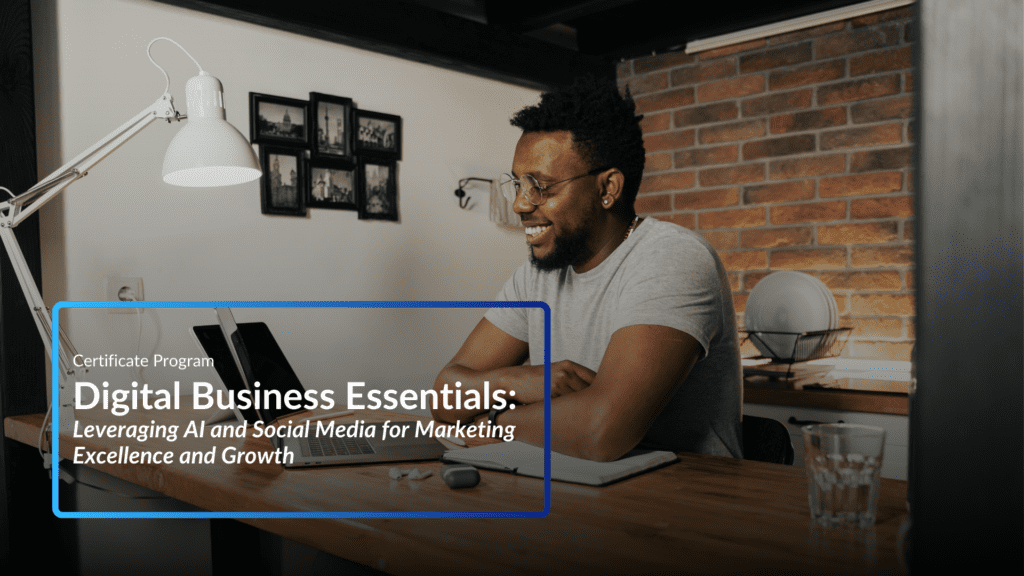Digital transformation represents a new era of business innovation, where technology integration is the key to achieving AI-driven business growth and navigating the future of work. In this guide, we will discuss the strategies and steps that can help businesses thrive in the digital age, including the transformative potential of emerging technologies such as artificial intelligence.
We will also discuss an exciting opportunity for employers to receive up to 100% funding for our newest course, Digital Essentials: Leveraging AI and Social Media for Marketing Excellence and Growth.
Let’s delve into the exciting world of digital transformation and discover how it can enhance operational efficiency, drive business growth, and create a tech-enabled customer experience.
Before we get started, be sure to grab your free copy of AI Quick Guide for Small Businesses.
Understanding digital transformation
With the rise of the digital era, it has become imperative for businesses to embrace digital transformation for growth and survival. Before we delve into the strategies, understanding the essence of digital transformation is crucial. Digital transformation involves the integration of technology into business operations, processes, and models, allowing organizations to stay ahead of the competition and adapt to new market demands.
Emerging technologies such as artificial intelligence (AI), machine learning (ML), and the Internet of Things (IoT) play a crucial role in powering successful digital transformation initiatives. However, simply adopting these technologies is not enough. Strategic technology implementation is key to driving innovation and staying ahead in the ever-evolving digital landscape.
Businesses must develop a clear vision, align technology initiatives with their goals, and adapt to emerging technologies to remain competitive. In the next sections, we’ll explore the impact of digital transformation on businesses, along with the strategies and tactics for successful implementation.
The impact of digital transformation on business
Digital transformation has the power to revolutionize modern businesses and drive innovation. As technology continues to evolve, leveraging tech-driven solutions has become crucial for staying competitive in the market. By strategically implementing digital transformation initiatives, companies can enhance their business strategies, improve operational efficiency, and unlock new opportunities for growth.
Digital transformation isn’t just about implementing new technologies, but also about fostering a culture of innovation and collaboration within the organization. By creating a tech-enabled ecosystem, businesses can stay agile and respond to changing market demands.
The benefits of digital transformation are numerous, from improving customer experiences to streamlining operations and reducing costs. By embracing this transformative journey, businesses can achieve long-term sustainability and drive business innovation.
However, successful digital transformation requires strategic technology implementation and a clear understanding of business goals. By prioritizing digital transformation initiatives and aligning them with organizational objectives, businesses can drive innovation and stay ahead in the ever-evolving digital landscape.
Overall, digital transformation can be a game-changer for businesses, enabling them to unlock new opportunities and achieve sustainable growth. By embracing this tech-driven future, companies can create a brighter future for themselves and their customers.
Leveraging Artificial Intelligence and Machine Learning
In the era of digital transformation, Artificial Intelligence (AI) and Machine Learning (ML) play a critical role in driving innovation and growth. AI can be harnessed in various business functions, such as improving marketing and customer service and automating processes.
However, ethical considerations are also important when leveraging AI. Responsible AI practices must be followed, and businesses must ensure that they are not perpetuating biases or discrimination. Furthermore, in the age of AI-powered technologies, workforce development is crucial. Training and upskilling employees are necessary to ensure that they can adapt to the new work environment.
By leveraging the power of AI and ML, businesses can unlock new opportunities for growth, and stay competitive in the ever-evolving digital landscape.
Enhancing Operational Efficiency
Digital transformation is revolutionizing the way businesses operate, enabling them to achieve higher operational efficiency and stay agile in the ever-evolving market landscape. By leveraging the power of technology, businesses can streamline operations, automate processes, and optimize resource allocation.
Business automation is a critical component of digital transformation, providing the foundation for enhanced operational efficiency. By automating routine tasks, businesses can free up valuable time and resources to focus on strategic initiatives and value-added activities. Technology integration is another key element of digital transformation, enabling businesses to connect disparate systems and streamline data flow.
With the right digital tools and technologies, businesses can achieve higher operational efficiency, reduce costs, and enhance productivity. The benefits of digital transformation are clear: by embracing it, businesses can create a leaner, more efficient workforce and achieve sustainable growth.
The Future of Work in the Digital Era
The rise of digital transformation is changing the landscape of work as we know it. As technology continues to advance, businesses must adapt to stay ahead of the curve. Automation, AI, and other emerging technologies are revolutionizing the way we work and providing new opportunities to enhance productivity and efficiency. However, this transformation also demands a change in the workforce’s skill set to adapt to the new normal, creating a need for workforce development in the AI era.
Businesses must prioritize upskilling and reskilling their employees to keep up with the demands of the tech-enabled workplace. With the integration of technology, workers can perform their jobs more effectively, efficiently, and accurately.
However, it’s important to strike a balance between automated processes and the human touch. Technology should support and complement workers’ skills and allow them to focus on areas that require critical thinking and creativity.
The future of work is not just about technology integration; it’s also about human adaptability. Employees must be open-minded and willing to learn new skills to stay relevant in the digital age. Adopting a growth mindset is crucial to thrive in the tech industry and embrace the change that comes with digital transformation.
Saskatchewan business owners: reskill your workforce with fully-funded certificate program
Government funding programs such as the Canada-Saskatchewan Job Grant can make reskilling employees easy; under this particular program, employers receive up to 100% reimbursement for eligible training such as our Digital Business Essentials Certification Course.








